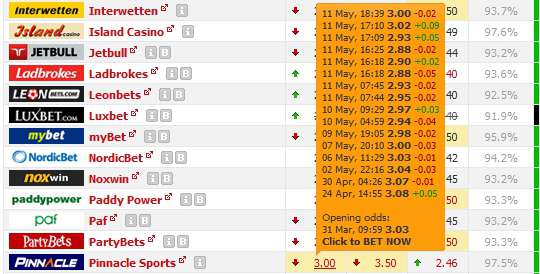
3. Fair odds (‘true’ or ‘zero’ odds)
Dortmund 35.3% → 2.83
Bayern 38.4% → 2.60
Draw 26.3% → 3.80

The above screenshot shows Betfair’s odds two days before kick-off. You can clearly see the market odds were pretty close to our calculations. However, the draw is priced slightly lower than our prediction and Dortmund to win is slightly higher.
Why?
Bookmakers and betting exchanges often publish their odds several weeks in advance taking historical data into account (in the same way we’ve described above):

Pinnacle opened their book on 31st March, some six weeks before the game with odds of 3.03 for a Dortmund win.
Their opening price for the draw was 3.5:

Pinnacle opened with odds of 2.47 for a Bayern victory:

4. Bookmaker opening odds 31.3.2012:
Dortmund 3.03 (33.0%)
Bayern 2.47 (40.5%)
Draw 3.5 (28.6%)
Bookmaker’s overround: 2.1% (this plays no role in our computations).
The bookmaker opening odds are naturally not the same as our set of results since they computed at least 6 weeks before the start of the match. This means that they have to have used older statistics when computing their odds.
5. Most up-to-date calculated fair odds 10.5.2012:
Two days before the actual match (with no more matches to be played by the teams to influence the statistics) the mathematical odds were as follows (as per the computations explained above):
Dortmund 2.83 (35.3%)
Bayern 2.60 (38.4%)
Draw 3.80 (26.3%)
You can see Dortmund’s chances of winning this match have slightly improved compared to 6 weeks before, whilst the expected values for both ‘Bayern to win’, and ‘the draw’, have slightly drifted.
6. Mixed calculation before start of the match:
The averages of the pre-match odds and bookmaker opening odds are as follows:
Dortmund (3.03 + 2.83) divided by 2 = 2.93
Bayern (2.47 + 2.6) divided by 2 = 2.54
Draw (3.5 + 3.8) divided by 2 = 3.65

It can clearly be seen that the market odds 5 minutes before kick-off correspond pretty closely to the mathematical-statistical calculations without taking any variables into consideration such as weather conditions, the referee, player injuries, suspensions, et cetera.
Why? Because none of these variables actually matter!
Even if there were a tiny correlation between these variables and the actual outcome, the correlation is mathematically-statistical irrelevant for the computation of ‘true’ odds. Further, there is not enough data to reliable compute it.
However, at kick-off, Dortmund were 2.4% over-priced and the draw was 2.3% under-priced. This slight deviation may be attributed to pure supply and demand, or perhaps from trading bot activity. Most traders admit that they don’t even know how odds are calculated and don’t care.
This same statistical approach to odds and ‘value’ can be applied easily to the following bet classes:
- Draw – No Bet
- Half-time result (H-D-A)
- Under/Over ‘X’ goals (full-time & half-time)
- Both teams to score
If you would like to learn more about odds calculation, probability computation and ‘value’ bet identification, perhaps consider buying our Fundamentals of Sports Betting course. Understand odds, pick your staking plan and you have all you need in order to win money from long-term betting.






Hi Soccerwidow,
In my attempt to calculate the true odds for this year’s Europa League final between Liverpool & Sevilla, i would consider the last 30 away matches (all competitions, except friendlies) for both clubs , and the results of Liverpool against Spanish opposition when playing away plus the results of Sevilla agianst English teams when away, over the last 10-12 yrs
would you agree ?
thank you in advance
Socrates